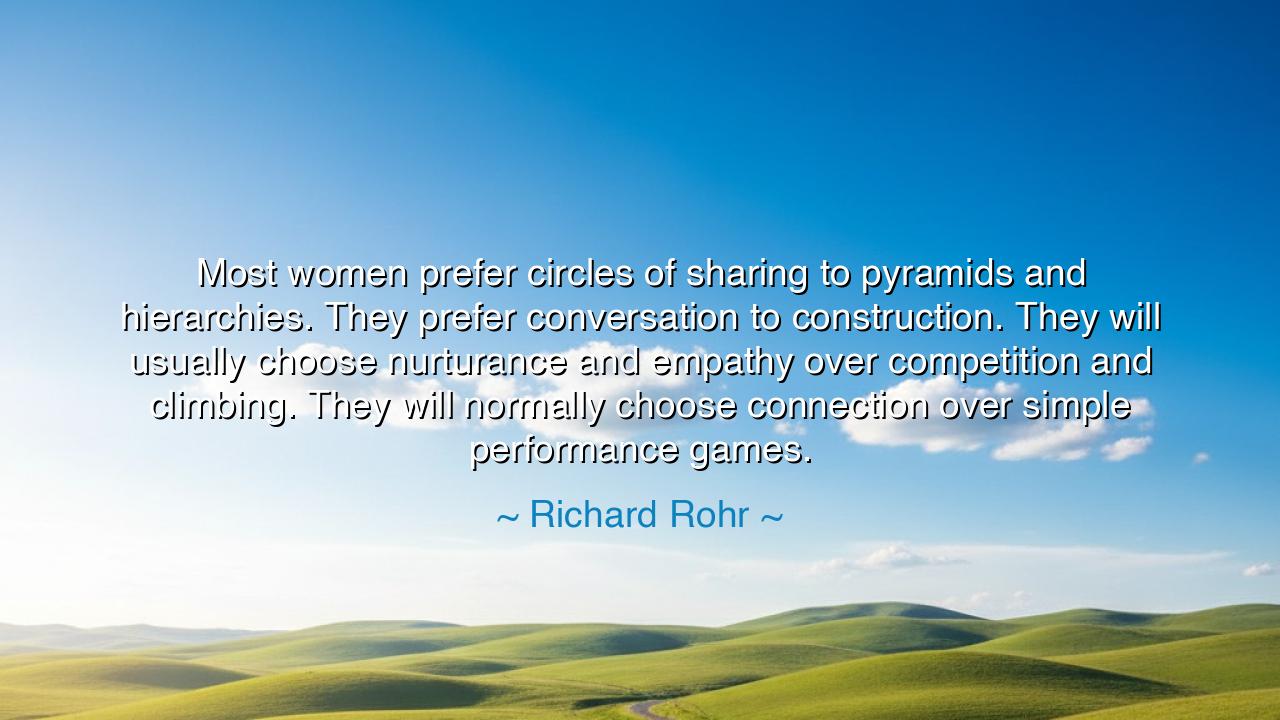
Most women prefer circles of sharing to pyramids and
Most women prefer circles of sharing to pyramids and hierarchies. They prefer conversation to construction. They will usually choose nurturance and empathy over competition and climbing. They will normally choose connection over simple performance games.






Hear, O seekers of wisdom, the words of Richard Rohr, who has walked the paths of contemplation and the spirit: “Most women prefer circles of sharing to pyramids and hierarchies. They prefer conversation to construction. They will usually choose nurturance and empathy over competition and climbing. They will normally choose connection over simple performance games.” In these words, he reveals the ancient truth that the feminine heart often seeks harmony over conquest, and relationship over rivalry.
For the circle has always been the shape of community, of equality, of belonging. Around the fire in old villages, women gathered in circles to tell stories, to share wisdom, to tend to children and to one another. The circle has no top and no bottom, no throne and no underclass. In it, every voice is heard, every hand is equal. In contrast, the pyramid and hierarchy reflect dominion and ascent—structures where some must be below if others are to rise above. Rohr declares that women, more often than not, choose the first path: the way of shared life over the ladder of ambition.
Consider the story of the Iroquois Confederacy. Though chiefs were chosen, it was the women—keepers of the hearth and of the crops—who appointed and removed them. Their governance was rooted not in competition but in nurturance, ensuring that leaders remained accountable to the people. This ancient wisdom shows that empathy and connection can forge stability stronger than force, and that circles of counsel often endure where pyramids of power collapse.
Rohr’s words also speak against the modern obsession with “performance games”—the endless climbing, competing, and proving that often defines success. While such striving may yield victories, it often leaves the soul barren and relationships broken. Women, in choosing conversation over construction, remind the world that the truest measure of greatness lies not in how high one stands, but in how deeply one connects, listens, and gives.
Therefore, let this wisdom be passed down: the strength of humanity does not lie solely in pyramids of power, but in circles of sharing. If the world is to be healed, it must learn again the art of empathy, nurturance, and connection that Rohr attributes to women. For these are not signs of weakness, but of enduring strength, the very roots of community and the seedbed of peace.






DDaovanduc
This quote from Rohr feels like a reflection on the power of emotional intelligence and nurturing qualities in relationships. The idea that women might favor empathy and connection over competition is thought-provoking. But does this imply that women are inherently less ambitious or driven than men? Or is it more about the environments they are in, and how societal norms shape their roles? How do we navigate these expectations and allow for more fluid expressions of leadership and ambition, regardless of gender?
LKLe Kha
Rohr’s idea that women tend to choose connection over performance-based interactions raises an important point about emotional intelligence in relationships. But is it always true that women prefer these values? In certain environments, like the corporate world, do women find themselves adopting competition and performance as a survival mechanism? How can we create more inclusive spaces that allow both men and women to lead with empathy, while also encouraging personal achievement?
VNPham Van Ngot
I find Rohr’s view on women choosing nurturance and empathy over competition intriguing. It paints a picture of a more collaborative approach to relationships, both personally and professionally. However, does this generalization account for the diversity among women? Could some women, just as much as men, choose competition and performance? How do we ensure that women’s voices are not boxed into certain expected traits, but rather, allowed to express the full range of their identities?
UGUser Google
Richard Rohr's quote about women preferring circles of sharing over hierarchies resonates with how many view social dynamics today. It suggests that women might prioritize emotional connection and mutual support over competition and climbing the social ladder. But how much of this is influenced by societal expectations versus innate preferences? Are these traits universal, or are they shaped by culture and environment? Can men and women equally embrace these values, or is this perception limited by traditional gender roles?